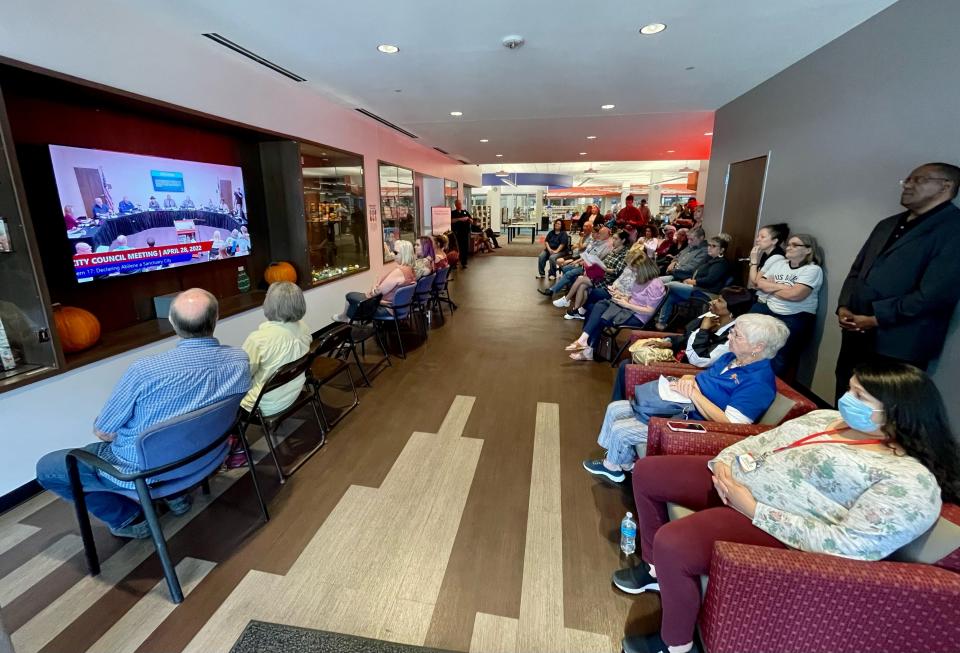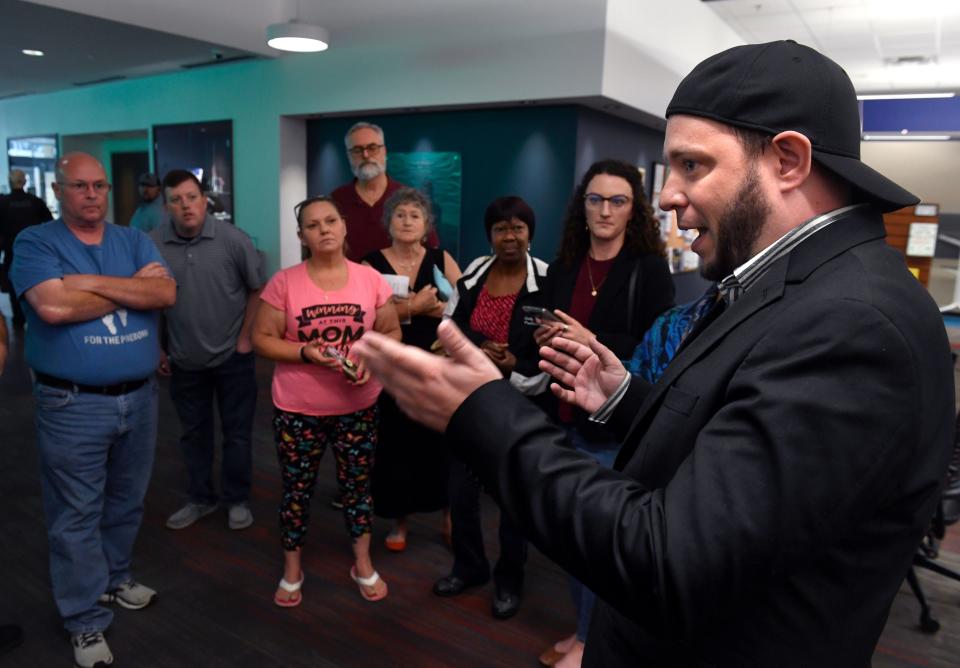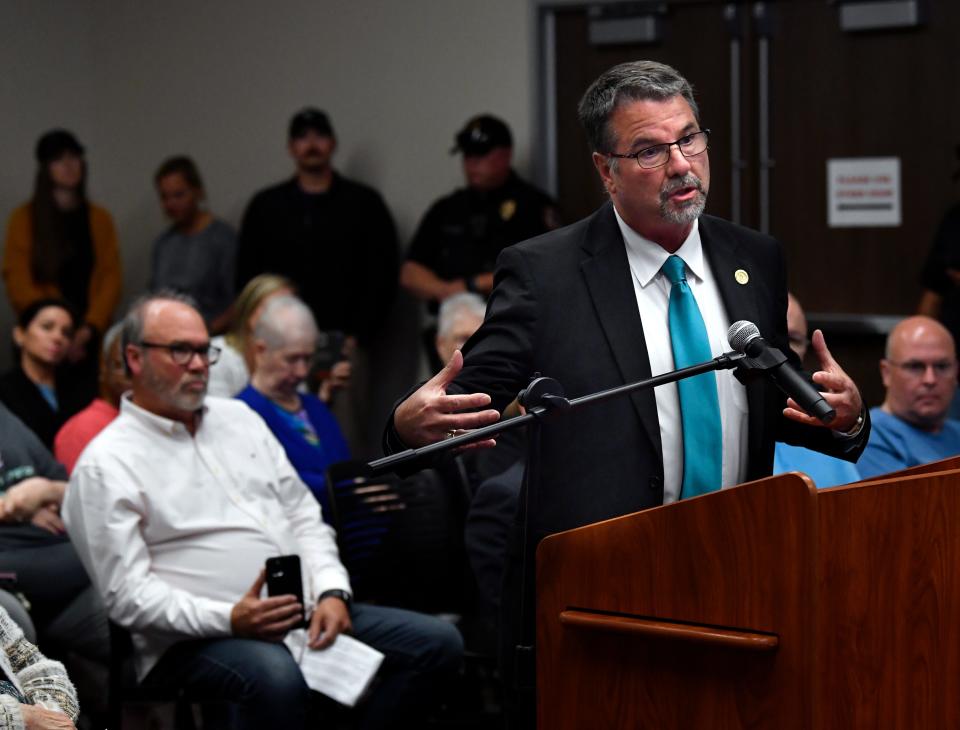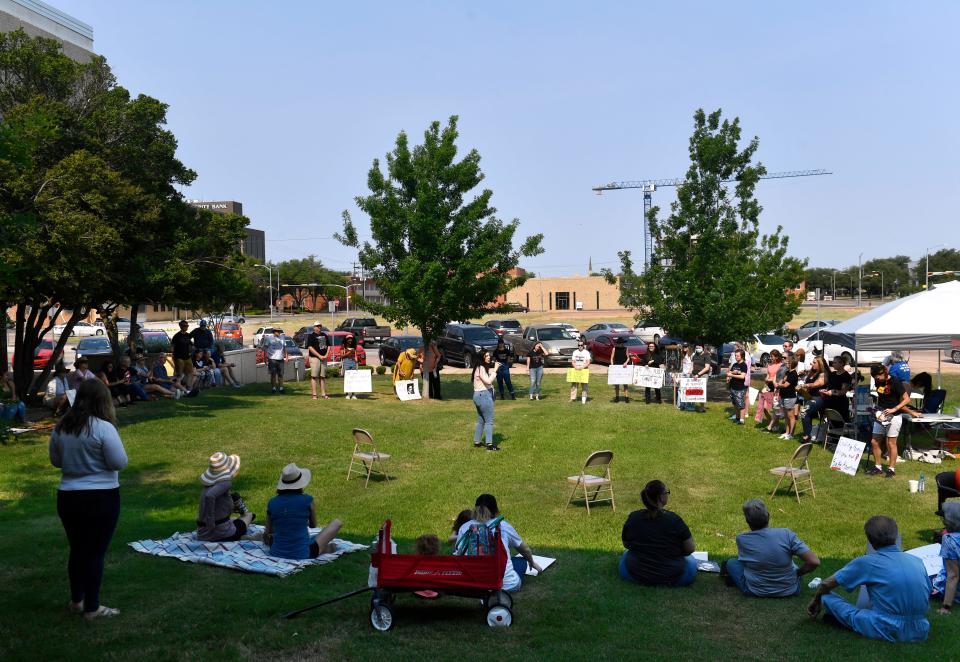'Sanctuary city for the unborn' ordinance creates rifts, allies in march to November vote
Not long after the Abilene City Council voted in a 4-3 decision to send an ordinance that proposes making Abilene a "sanctuary city for the unborn" to voters in November, Place 2 Abilene City Councilman Lynn Beard got an email.
The note was from a pastor in town, he said, its text “telling me that I have chosen to murder babies."
That kind of discourse, he said, “doesn't facilitate intelligent discussion and productive, constructive analysis,” he said.

“I feel like it's incumbent upon every single elected official to fully think through, to the greatest extent possible, what the implications of the decision are going to be,” he said. “And we can't do that in this case because we have no ability to change it.”
The ordinance required a months-long petition drive to collect at least 6,483 signatures, equal to 10% of qualified voters as of the city's municipal election in May 2021.
Supporters have stated they collected around 12,000 signatures.
However, according to the City Secretary's office, the number of verified signatures recorded is 7,042, with verified corrections and additions.
Unalterable
The text of the 18-page ordinance states life begins at conception, that "abortion is an act of violence that purposely and knowingly terminates an unborn human life," and that unborn human beings are "entitled to the full and equal protection of the laws that prohibit violence against other human beings."
The ordinance further states Texas never repealed its pre-Roe v. Wade statutes, and that the Legislature has "reaffirmed the continued existence and validity" of those statutes.
Those laws define abortion as a criminal offense unless to save the life of a mother and impose "federal criminal liability on anyone who 'furnishes the means for procuring an abortion knowing the purpose intended,'" as well as anyone who "aids or abets an abortion performed in violation of Texas law."
The "Declarations" portion of the ordinance states Abilene "to be a Sanctuary City for the Unborn" and that abortion is "at all times and all stages of pregnancy to be declared to be an act of murder unless the mother's life is in danger."
It declares abortion-inducing drugs as "contraband," with possession of them within the city limits to be unlawful.
It also "urges the district attorneys of Taylor and Jones counties to investigate and prosecute any individual or organization that 'furnishes the means for procuring' an elective abortion or otherwise aids or abets" such.
Those would include:
► Employers and insurers who arrange for coverage of abortions in Texas;
► People and organizations that provide transportation to or from an abortion provider;
► People and groups who knowingly pay for another person's abortion in Texas;
► Individuals who knowingly donate money to abortion funds and abortion-assistance organizations that aid and abate abortions performed in Texas; and
► People or organizations that offer or provide "abortion doula" services in Texas.
The ordinance, as written, states the "city of Abilene urges all of its citizens to regard those who perform or assist elective abortion as criminals consistent with the abortion laws of Texas and to report those criminal activities to the relevant district attorneys for investigation and criminal prosecution."
The sanctuary city ordinance is the work of Mark Lee Dickson of East Texas Right to Life, who has shepherded the movement since its beginning, and attorney and former Texas Solicitor General Jonathan F. Mitchell.
Mitchell and state Sen. Bryan Hughes crafted the state's so-called "Heartbeat Act" in 2020. It bans abortion after about six weeks and shares components pioneered in the sanctuary city movement.
Wars of words

Controversy over the ordinance has resulted in wars of words on Facebook, while it deeply influenced the most recent City Council election, with three candidates – Charles Byrn, Dorothy Clay and James Sargent – throwing strong support behind it.
In the end, none of those candidates prevailed at the ballot box.
Councilman Kyle McAlister and Travis Craver, both of whom voted to move the ordinance on to voters as part of a 4-3 vote, won their respective races, each facing candidates that favored passing the ordinance outright.
Clay and Byrn split an almost even number of voters, while Craver took roughly 55%, McAlister winning against Sargent by 61%.
The choice to move the item to voters’ hands caused controversy, some supporters saying the city’s charter required it to be voted up or down by council members, which would have required those who wanted to move it to voters to publicly vote for or against it.
Beard, who voted to put the item on a ballot, and others maintain Section 31 of the charter allowed the option to directly send the item to an election.
That section in part reads:
Any initiated ordinance may be submitted to the council by a petition signed by qualified voters of the city equal in number to at least ten (10) per centum of such voters computed as of the date of the last regular municipal election. Such ordinance may be passed by the council without change, or submitted to the voters at an election called for that purpose.
Beard said those in opposition interpreted “failed to pass” differently than he and others on the council did.
“We could have not done anything. We could have not made a motion,” he said. “We could have voted no across the board, and it would have gone to the voters. There are multiple pathways.”
That includes, he said, according to the city’s charter in Section 31, sending the item to voters via a motion.
Beard said what he saw in the ire raised by opponents to the council's vote was more about gaining traction in the recent council election than advocating the goal at hand.
Playing politics?

Advocates for passing the ordinance outright, or forcing council members to actually vote for or against it, see things differently – and believe those who advocated it be sent on to voters were playing politics in light of the May 7 election.
In a letter to the city, attorney and one-time state representative candidate Isaac Castro for political action group Project Destiny, which spearheaded the petition process, argued the council had “neither passed, nor has it failed to pass, the ordinance.”
He asked for a special called meeting to vote again, arguing that McAlister and Craver’s vote to send the ordinance to voters was a "political ploy." Castro also argued their “goal to appear prolife by their vote (April 28) will have succeeded” should the election favor them.
"It is our position that no proper vote on the proposed ordinance has occurred," Castro wrote. "No one is required to support or oppose the submission to the voters as it occurs by operation of law and the City Charter. ... If the motion had failed, there would be no consequence since the ordinance must be submitted to the voters if the council fails to pass the ordinance."
The city of Abilene on Monday responded with a short response defending the vote:
"The (Abilene) City Council acted in accordance with the requirements of state law and the municipal charter."
Sanctuary for freedom?

The ordinance also was the topic at a May 14 "Bans Off Our Bodies" rally for abortion rights, one of many throughout the country to try to influence the Supreme Court after a recent leaked opinion indicates a taste by the conservative-leaning body to overturn Roe v. Wade.
Some speakers raised an alarm because of the ordinance's — and the Heartbeat Act's — lack of exceptions for rape and incest, as well as its general intent.
Some advocated for a petition drive to put before voters a proposal to make Abilene a "sanctuary city for freedom," including freedom to choose.
"I'd like the freedom to think my own mind and not think that my neighbors might report on me for some suspicion that I helped someone else exercise their freedoms," said Elizabeth Smyser, who organized the event.
"I'd like the freedom for people in this community to be able to come forward and speak their stories without shame. I'd like the freedom to have not only my own opinion, but my own beliefs."
Brian Bethel covers city and county government and general news for the Abilene Reporter-News. If you appreciate locally driven news, you can support local journalists with a digital subscription to ReporterNews.com.
This article originally appeared on Abilene Reporter-News: 'Sanctuary city for the unborn' ordinance creates rifts, allies

